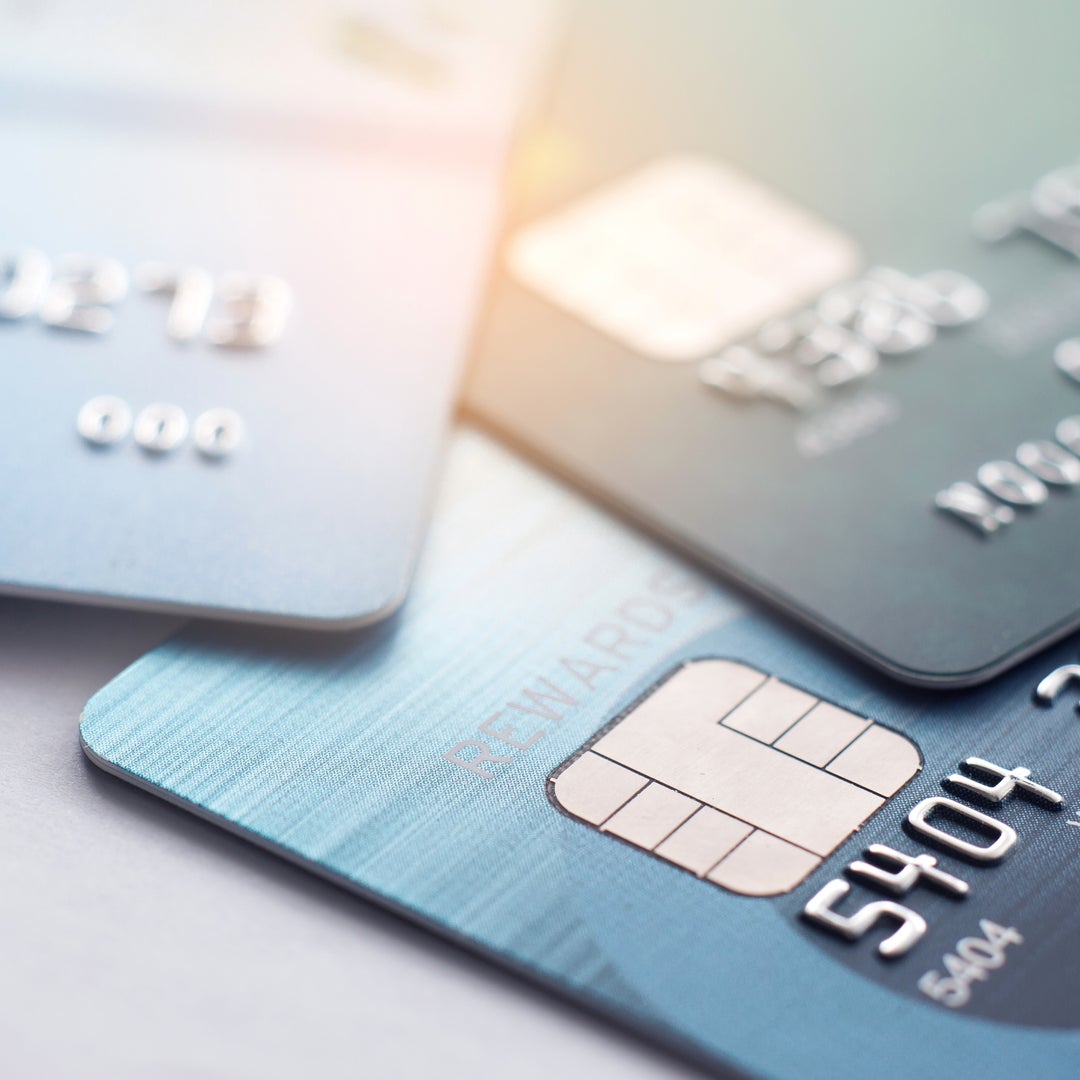How Many Credit Cards Should I Have?

If you’re new to the world of credit, you probably find yourself asking a lot of questions. What’s a good interest rate? Are rewards programs worth it? How can you improve your credit score? But there’s one question a lot of people rarely stop to ask but should: How many credit cards should you own?
You might not think it matters all that much, but the truth is the number of credit cards you own could have an impact on both your credit score and overall financial health.
Factors That Impact Your Credit Score
Your credit score is a three-digit number that is used by banks and lenders to determine your creditworthiness (i.e., how risky you are as a borrower), an understanding that they will go on to use to set your interest rate and credit limits. If you have a poor credit score (579 and under), you will likely pay a higher interest rate and have a lower credit limit compared to someone who has a very good (740 to 799) or exceptional (800 to 850) score. A high credit score can also bring a number of other benefits, too.
Ultimately, your credit score is generated by an algorithm that takes into account a number of factors found on your credit report. While each of the major credit bureaus calculates these scores in a unique way, the five major factors that will impact your score are:
1. Payment history
This refers to your track record when it comes to making payments. Because this accounts for roughly 35 percent of your credit score, it is incredibly important that you consistently pay your bills on time.
2. Total amount of debt owed
Your credit-utilization ratio is a representation of how much of the credit available to you is being used, and it accounts for roughly 30 percent of your credit score. Generally, the lower this number, the better. Experian recommends that individuals keep their utilization rate below 30 percent.
3. Length of credit history
This refers to the average age of all accounts on your credit report, which can include everything from debt (credit cards, student loans, mortgages, etc.) to utility bills. The longer your credit history, the better. This accounts for 15 percent of your credit score.
4. Credit breakdown/credit mix
The specific mix of credit that you carry accounts for 10 percent of your credit score. Generally, lenders look favorably on borrowers who demonstrate they can handle different types of credit, including revolving credit (like credit cards), service credit (like utility bills) and installment credit (like a student loan or mortgage).
5. New credit applications
If you open a number of credit lines in a short period of time, it can be a signal to lenders that you are experiencing financial trouble. This can have a negative affect on your credit score. New credit applications account for roughly 10 percent of your credit score.
How the Number of Credit Cards You Carry Can Affect Your Finances
According to research conducted by Experian, on average, Americans have three credit cards in their wallet or purse. But does that make three the magic number?
Ultimately, whether or not you should own multiple credit cards will be a personal decision that you should make after careful consideration. Below are some of the ways—both positive and negative—that having multiple credit cards can influence your credit score and finances.
Pros of Having Multiple Credit Cards
1. Owning multiple credit cards will increase your total available credit
When you open a new credit card account, you are instantly increasing the total amount of credit that is available to you. By increasing your total credit limit, you lower your overall utilization rate (which accounts for 30 percent of your credit score).
As an example, imagine that you have a single credit card with a credit limit of $500, and you currently carry a balance of $250. Your total utilization rate would be 50 percent, which is greater than the 30 percent typically recommended. If you were to open a second credit card which also had a limit of $500, your total available credit would jump up to $1,000. This would give you a new total utilization rate of only 25 percent, which could give your credit score a boost.
That being said, there are ways to improve your utilization rate without opening a new card. You could, for example, simply ask your lender to increase your limit. And, of course, paying off that balance will help, too.
2. Owning multiple cards can help you keep your individual utilization rates low
Your total available credit and total credit utilization rate is important, but it is not the only utilization factor that the credit bureaus consider. They also consider your credit utilization rate on individual cards. Having multiple credit cards gives you the option of splitting payment across multiple accounts, which can help prevent you from damaging your scores.
Using 20 percent of the available credit on each of two cards will be better for your credit health than using 40 percent of the available credit on a single card, for example. And using 20 percent on each of five available cards will be much better for your credit health than maxing out a single card.
3. Credit cards come in a lot of different varieties
Credit card rewards programs are a major consideration for many individuals who choose to open a credit card. While owning one credit card will give you access to one set of benefits and (potentially) a rewards program, owning and using multiple credit cards could give you access to a much wider set of benefits.
You might, for example, own a credit card that you specifically use when making travel-related purchases, in order to rack up airline miles that you can redeem for free or cheap plane tickets. Or, if you find yourself shopping at a particular retailer frequently, you might consider opening a card with them in order to earn cash back from each purchase you make.
It is important, though, to remember that most credit cards come with fees, which can eat into the value of any rewards that you are earning by using your card.
4. Owning multiple credit cards can help you qualify for a major loan
While avoiding debt is good for your overall financial health, it can come with one serious downside: a lack of credit history for lenders to reference when considering you for a loan. Without a solid track record showing that you know how to manage and pay back debt, many lenders may turn you down for a loan—even if you earn a high income and have solid cash reserves.
“Most major lenders—especially mortgage lenders—want to see at least three lines of credit on your credit report, which can also include student loans, a personal loan or an auto loan,” says Pamela Capalad, Certified Financial Planner and founder of Brunch & Budget. “If you don’t have any of those, my advice is to work up to three credit cards.”
Cons of Having Multiple Credit Cards
1. Each new credit application involves a hard inquiry
Credit checks come in two varieties:
-
A soft inquiry or soft pull, which happens when you check your credit score through a service like Credit Karma.
-
A hard inquiry or hard pull, which occurs when a lender or financial institution pulls your credit report in order to make a lending decision.
While soft inquiries do not impact your credit score, hard inquiries can and do affect your score, typically lowering it (in the short term) by a few points. Because applying for a new credit card results in a hard inquiry on your report, this means that you can see a ding in your score—even if you are not ultimately approved. And if you apply for multiple credit cards in a short period, this impact can be multiplied for each application (and subsequent hard inquiry).
2. Opening a new credit card will lower your average credit age
If you open a new credit card, you will be shortening the average age of your credit history. That’s because your new card has an age of 0—it’s like a newborn. If you’ve already got a healthy number of credit lines with long histories, the impact of this change is likely to be small; but if you’ve only got a few accounts in your name, the impact could be greater.
Bear this in mind, especially if you are planning on taking out a major loan such as a car loan, student loan, or mortgage in the near future, as even a small dip in your scores could lead to significant financial consequences.
3. Multiple credit cards equals multiple fees
As mentioned above, most credit cards are not free to use. While some will offer promotional periods without fees, those periods typically end after a year or two. After that, you will likely be on the hook for an annual fee, which is likely to eat into any value that you are realizing from your cards.
A single credit card with an annual fee of $100 might not be too bad in the grand scheme of things, but it could get quite expensive if you carry multiple cards. Multiply that by five, and you’re starting to talk about some serious money—money that you could put to better use investing, building up an emergency fund or preparing for your future.
4. Each new account carries the risk of identity theft
Every time that you open a new credit card, you are creating a financial record with a new company. As we’ve learned from the Equifax hack in 2017, it is incredibly difficult, if not impossible, for a company to guarantee that your information will be one-hundred percent secure from hackers.
This means that each new credit card you open is one more doorway that a hacker or scam artist can use to wreak havoc on your financial well-being. Even if opening a new credit card might not have too much of an impact on your credit score, the security aspect is something that you should consider before opening any new account.
5. Opening a new credit card won’t solve spending problems
If you are considering opening a new credit card because you’re close to maxing out an old card (or you already have), that is a serious cause for concern—and likely a sign that you should think twice.
Sure, opening a new card might help you in the short-term by giving you access to new funds, but it won’t solve for issues with overspending and undersaving.
“More credit means more temptation to spend,” says Capalad. “This is where having a clear picture of your spending and the discipline to stay on budget (and pay off the balance) becomes important.”
So, How Many Credit Cards Should You Have?
Ultimately, it all comes down to balance. There is no right or wrong answer to the question. What is right for you will depend on your own personal financial situation, and could vary significantly from what is right for someone else.
What is clear, though, is that healthy financial habits can help you stay out of trouble when it comes to credit. Build an emergency fund so that you don’t find yourself turning to credit when an unexpected expense pops up. Always pay off your credit card balance in full each month in order to avoid outrageous interest charges. And, importantly, understand the different factors that may impact your credit score, and act accordingly.
If you think that you have too many credit cards, you might find yourself wondering whether or not it makes sense to close one or more accounts. Closing a credit card can cause your total available credit and your credit utilization rate to change, and may shorten your average credit age, which can have a negative impact on your credit scores.
While closing a credit account is a personal decision, if you do decide to move forward, you’ll want to try and preserve the oldest accounts and those with the best payment histories and highest credit limits.
This material has been presented for informational and educational purposes only. The views expressed in the articles above are generalized and may not be appropriate for all investors. The information contained in this article should not be construed as, and may not be used in connection with, an offer to sell, or a solicitation of an offer to buy or hold, an interest in any security or investment product. There is no guarantee that past performance will recur or result in a positive outcome. Carefully consider your financial situation, including investment objective, time horizon, risk tolerance, and fees prior to making any investment decisions. No level of diversification or asset allocation can ensure profits or guarantee against losses. Article contributors are not affiliated with Acorns Advisers, LLC. and do not provide investment advice to Acorns’ clients. Acorns is not engaged in rendering tax, legal or accounting advice. Please consult a qualified professional for this type of service.








